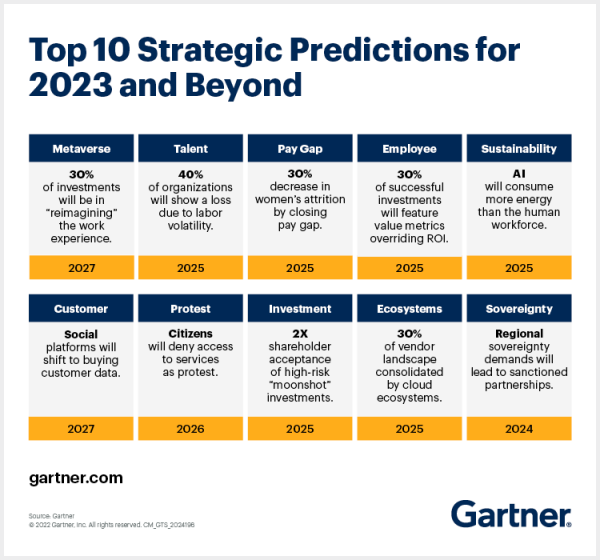Gartner®, a research and advisory company, has published its Top 10 Strategic Predictions for 2023 and Beyond. These predictions are based on their analysis of current and emerging trends, and they reflect the company's view of how these trends will impact businesses in the coming years.
The theme of this year's predictions is "seize uncertainty," which prompts organizations to focus on the weakest link in the chain of their success – themselves. It challenges thinking and action at the same time because it recognizes uncertainty is a repository for "hope" – for opportunity.
The Top 10 Strategic Predictions for 2023 and Beyond are:
- Virtual Workspaces: By 2027, fully virtual workspaces will make up 30% of investment growth by enterprises in metaverse technologies and will have a transformative effect on the traditional office experience.
- Labor Volatility: By 2025, "labor volatility" will lead to significant financial consequences for 40% of organizations, resulting in a shift in their talent strategy from acquisition to resilience. This means that these organizations will focus on flexibility in order to maintain consistency and stability in their operations.
- Gender Pay Gaps: By 2025, organizations that address documented gender pay gaps will see a 30% decrease in women's attrition, easing pressure on talent shortages. This suggests that addressing pay disparities can be an effective way for organizations to retain talent and improve diversity in the workplace.
- Employee Value Metrics: Through 2025, factors such as employee well-being, burnout, and brand satisfaction will be prioritized over return on investment in 30% of successful growth investment decisions. This means that companies will place a greater emphasis on the well-being and satisfaction of their employees when making investment decisions.
- AI Energy Consumption: By 2025, if sustainable AI practices are not put in place, AI will consume more energy than the human workforce, significantly offsetting carbon-zero gains. This highlights the importance of considering the environmental impact of AI and implementing sustainable practices to minimize this impact.
- "Customer as Product" to "Platform as Customer": By 2027, social media platform models will change from viewing the customer as the product to viewing the platform as the customer of decentralized identity, which will be sold through data markets. This means that social media platforms will increasingly focus on selling data about their users to third parties, rather than relying on advertising as the primary source of revenue.
- cDOS (citizen-led denial of service) Attacks: By 2026, citizen-led denial of service (cDOS) attacks using virtual assistants to disrupt operations will become the fastest growing form of protest. This means that individuals or groups will use virtual assistants, such as chatbots or voice assistants, to flood a system with requests, causing it to become overwhelmed and unable to function properly. cDOS attacks have the potential to cause significant disruption to organizations and have already been used in a number of high-profile instances.
- Speculative Investments: By 2025, shareholder acceptance of moonshot speculative investments, which are high-risk, high-reward projects with the potential for significant impact, will double. This will make them a viable alternative to traditional research and development spending as a means of accelerating growth. The prediction suggests that companies will increasingly turn to moonshot investments as a way to drive innovation and growth.
- Powerhouse Cloud Ecosystems: Through 2025, powerful cloud ecosystems will consolidate the vendor landscape by 30%, reducing the number of options available to customers and limiting their control over their software choices. This means that the market for cloud services will become increasingly dominated by a small number of large players, making it harder for customers to choose between different vendors and potentially limiting their ability to customize their software.
- Jointly owned Sovereignty Partnerhips: Through 2024, joint ownership sovereignty partnerships that are sanctioned by regulators will increase stakeholder trust in global cloud brands and enable the continued globalization of information technology. This means that partnerships between cloud service providers and governments or regulatory bodies, in which the parties share ownership and decision-making power, will help to build trust in these brands and facilitate the expansion of IT into new markets.
More information can be found within the original Gartner Article about Top 10 Strategic Predictions for 2023 and Beyond which is a must-read to discover any required detail about these new emerging innovations.
Copyright: Gartner and the Top 10 Strategic Predictions graphic are property of Gartner, Inc. Any other mentioned brand names, website addresses and trademarks or logos, are the property of their respective owners.

